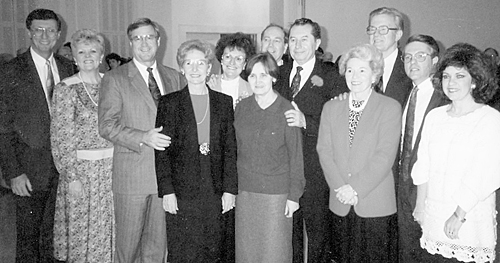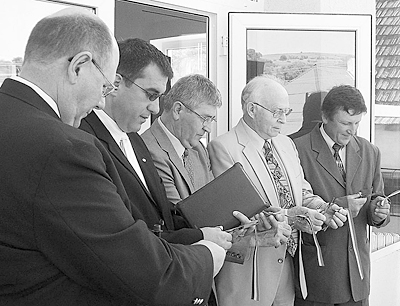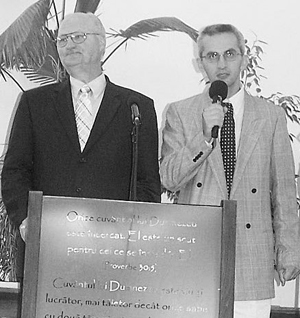Approximately six months after the revolution and the fall of communism, my father, Harry Dent, entered the country of Romania. Initially, he went to help with the John Guest Crusades, and the fields were ripe unto harvest. My father was impressed with the spiritual openness of the people and with methods being used to bring people to the Lord. He never dreamed that he would one day end up street preaching with a bullhorn, but it was here that he had one of the greatest spiritual experiences of his life.
 These “Romaniacs” from South Carolina, shown in an early photograph, were instrumental in establishing a missions partnership with Romania that is vibrant today. From left are Tom and Arlene Beal, Greg and Bobbie Horton, Betty and Harry Dent, Elisabeth and Joseph Tson (former president of the Romanian Missionary Society), Ginny and Alastair Walker, and Benny and Magaly Littlejohn.
These “Romaniacs” from South Carolina, shown in an early photograph, were instrumental in establishing a missions partnership with Romania that is vibrant today. From left are Tom and Arlene Beal, Greg and Bobbie Horton, Betty and Harry Dent, Elisabeth and Joseph Tson (former president of the Romanian Missionary Society), Ginny and Alastair Walker, and Benny and Magaly Littlejohn.He was literally run over by people moving forward to receive Christ and grasp a Christian tract. Communism and the cruel regime of Nicolae Ceaucescu had created a spiritual hunger, and the underground church was struggling to come to the surface. My father immediately identified with the persecuted brethren of the Baptist faith who had faced oppression, suffering, beating, and restrictions. Some had given their lives.
As a result of the John Guest Crusade in Cluj, Romania, my father was invited to meet with the leaders of that area and city. My father said to them, “We are relieved that communism is over, and we are here to help you.”
Help is on the way
My father clearly saw that the Romanians needed everything. They needed spiritual renewal, economic development, social and humanitarian reform, medical supplies and retraining, and rebuilding of its infrastructure. As he had promised the mayor of Cluj, my father initiated a sister-city relationship between Cluj and Columbia, S.C. With the help and cooperation of Mayor Bob Coble of Columbia, members of the Columbia World Affairs Council including Congressman Joe Wilson, the Columbia Chamber of Commerce, Providence Hospital and the USC Medical School, the sister-city relationship turned out to be very successful in helping Cluj to begin to recover from the devastating effects of communism.
During the 1990s, helping the people of Romania would become my father’s overseas passion. It would consume most of his time, energy and resources. The Romanian Baptists needed church buildings, Christian materials, Bibles, training – and, simply, more pastors. My father found the average pastor was shepherding 10 churches. Two of my father’s books, “A Layman Looks through the Bible for God’s Will” and “Cover Up: The Watergate in All of Us,” were immediately translated into Romanian and distributed.
Nothing could be finer
After those first few visits to Cluj, my father would return several times each year for almost 10 years, bringing other South Carolinians with him to assist with helping pastors, building churches, and social and medical ministries. Among those who came and continued to return were Greg and Bobbie Horton of Simpsonville, Jesse and Wilma Powers of Charleston, Jimmy and Peggy Morse of Surfside Beach, and John and Margie Simmons of Columbia.
Hundreds of South Carolinians traveled to Romania each year with my father, John and Margie, Greg and Bobbie, or Jesse and Wilma. My father worked with the government leaders, taught the Bible, and began the pastor adoption-support system that quickly took 40 Romanian believers called by God to be trained and set up as pastors in new churches. John and Margie Simmons handled all the planning, logistics and the shipping of supplies in containers. Greg and Bobbie Horton and Jesse and Wilma Powers would help with the building of churches.
In partnership with Romanian Baptists, South Carolina Baptist churches would contribute money to build and support much-needed churches in Romania. The Romanians would also contribute from their own pockets and supply most of the labor.
 South Carolina Baptists took part in the ribbon cutting at the dedication of Alunis Baptist Church. From left are David Carter, pastor of Faith Baptist, Swansea; Cornel Fedor, pastor of Alunis; Cornel Veres, president of Cluj Baptist Association; Jesse Powers, evangelist from Charleston; and Tica Podea, associate pastor of Alunis.
South Carolina Baptists took part in the ribbon cutting at the dedication of Alunis Baptist Church. From left are David Carter, pastor of Faith Baptist, Swansea; Cornel Fedor, pastor of Alunis; Cornel Veres, president of Cluj Baptist Association; Jesse Powers, evangelist from Charleston; and Tica Podea, associate pastor of Alunis.Then in 1998, the South Carolina Baptist Convention agreed to partner with Romania from 1998-2000. Debbie McDowell of the South Carolina Baptist State Convention would coordinate this effort. South Carolinians from all over the state came to Romania to help in this endeavor, which involved 7,097 volunteers working with 404 churches in Romania. The volunteers conducted sports clinics, medical clinics, Vacation Bible Schools, ESL classes, and Experiencing God classes. According to Debbie McDowell, they had 2,246 professions of faith during that three-year period.
My father was never sure who benefited the most from all these volunteers – the brethren in Romania, or the Americans who came to assist. Fellowshipping with those who had paid a dear price for their faith had an amazing effect on all who came. Those who came and got involved with a passion for Romania became known as “Romaniacs.”
It was during those years that I made my first trip to Romania in July of 1998. It was wonderful to be able to speak in churches with my dad and sing his favorite song, “People Need the Lord,” in Romanian. It was a joy to see the fruits of my father’s labor. I saw the work in orphanages, social ministries, medical ministries, and the retreat center, which was built to hold conferences and train pastors.
Return to Romania
On Sept. 28, 2007, my father died after a nine-year battle with Alzheimer’s.
After he received honorary citizenship in Romania for his work there in July of 1999, he was unable to return. Although these years were difficult for my family, the ministry to Romania continued with donations from faithful believers and with the help of John and Margie Simmons, Jesse and Wilma Powers, and Bobbie Horton Caldwell. In June of this year, I returned to Romania to see the work and was asked to speak and sing in churches. I was able to see churches that my father’s ministry had assisted in building and spend time with many of their pastors. Since the fall of communism, the city of Cluj has grown from three churches to eight churches, and the surrounding villages which had no Baptist presence continue to add churches as financial provisions have been made.
On June 22, 2008, I attended the opening of a new Baptist church in Alunis. The church dedication was attended by more than 400 people, with seating for only 200. Consistent with Romanian church dedication services, this one lasted four-and-a-half hours. I saw a bus unload with 14 members of Faith Baptist Church from Swansea, S.C. Their pastor, David Carter, and his wife Cathy led a group of members from their church to be a part of the dedication. This small, but powerful, church helped in the building of this new church along with Jesse Powers’ Ministry.
I discovered that Faith Baptist Church had already raised more money to help build another church in a nearby village. At the new church dedication, there was standing room only as villagers peered in windows to see what the celebration was all about. On the podium and outside the church stood two flags – one Romanian and one American. These flags were symbolic of the partnership between Romanian Baptists and America, which continues today with the Baptist people of South Carolina.
 Gerald Roe of North Greenville University inspires Romanians to be missions-minded through his Romanian interpreter, Daniel Lar.
Gerald Roe of North Greenville University inspires Romanians to be missions-minded through his Romanian interpreter, Daniel Lar.Since 2001, Romania has witnessed the emergence of a small middle class and has begun to address its widespread poverty. After Sept. 11, 2001, America was looking for allies. Romania opened up its airspace and later sent troops to help in Afghanistan and Iraq. Romania and her people have a pro-American mentality, which carries some risk. They are strategically located on the Black Sea and serve as a gateway to the Muslim world. They were invited to join NATO on Nov. 23, 2002, and officially became a member of NATO on March 29, 2004. The United States is currently building two American military bases in Romania in cooperation with their military. One training base is located in Babadag and the other one is an air base located near Constanza. The U.S. and Romania signed a treaty in December of 2005 which authorized a permanent U.S. military presence on Romanian soil. Even with these accomplishments, Romania still has a long way to go with new highways, village poverty, and developing a stronger economy. Of the countries represented in the European Union, Romania and Bulgaria rank as the poorest.
The 2002 census indicates that Romania is about 87 percent Romanian Orthodox. The goal of evangelical churches in Romania is to plant an evangelical church in every village. They are making great strides; however, with poverty still prevalent in the villages, there are many villages with little or no evangelical witness.
According to Patrick Johnstone, author of “Operation World,” Romania has Europe’s third-highest population of evangelicals behind the United Kingdom and Latvia. Johnstone also stated that “Romania has seen a substantial church-planting movement with an average of five new churches being built every week until 1999.” He believes that a lack of human and material resources has prevented this rate from continuing following 1999. During my recent visit, almost all of the village churches that I spoke in had declines in membership due to members moving to Spain, Italy and America, as a result of village unemployment. This is good for spreading the gospel in Italy and Spain, but hard on the churches in Romania.
Bible training for existing and future pastors remains a great need. The average pastor still has 3-5 churches to pastor. One day I followed one village pastor and spoke and sang in three of his five churches. I left at 6 a.m. and returned at midnight. There are new believers requesting that preachers come to their home to begin new churches, but there are not enough human resources to fulfill the need.
There is more good news on the horizon. North Greenville University is in the process of forming a partnership with the Baptists in Cluj?to assist in establishing an institute for biblical training.? While I was in Romania, Don Dowless, vice president of academic affairs for NGU, and Gerald Roe, associate professor of Intercultural Studies/Missions?for NGU, were both in Romania working to establish this partnership.?January 2009 is the projected start date.?At that time, they, along with Romanian Baptist leadership,?will provide much-needed training for the future leaders of Romania and inspire them to reach out and do mission work in the neighboring countries that are so close to their borders.
It appears to me that the special relationship between South Carolina Baptists and Romania Baptists continues today. May God continue to bless the wonderful work in Romania. For more information related to the work in Romania, contact me by e-mail at ginnybrant@msn.com, or Jesse Powers at jessepowers@juno.com. Powers will be leading trips to Romania in November.